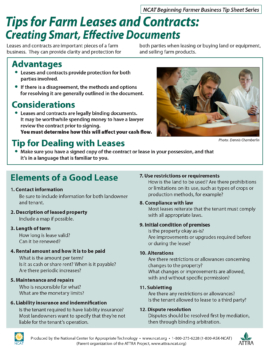Tips for Farm Leases and Contracts: Creating Smart, Effective Documents
NCAT Beginning Farmer Business Tip Sheet Series
By Marisa Alcorta, Rex Dufour and Tammy Hinman, NCAT Agriculture Specialists
Leases and contracts are important pieces of a farm business. They can provide clarity and protection for both parties when leasing or buying land or equipment, and selling farm products.
Advantages
- Leases and contracts provide protection for both parties involved.
- If there is a disagreement, the methods and options for resolving it are generally outlined in the document.
Considerations
- Leases and contracts are legally binding documents. It may be worthwhile spending money to have a lawyer
review the contract prior to signing. You must determine how this will affect your cash flow.
Tip for Dealing with Leases
- Make sure you have a signed copy of the contract or lease in your possession, and that it’s in a language
that is familiar to you.
Elements of a Good Lease
- Contact information
Be sure to include information for both landowner and tenant. - Description of leased property
Include a map if possible. - Length of term
How long is lease valid? Can it be renewed? - Rental amount and how it is to be paid
What is the amount per term? Is it as cash or share rent? When is it payable? Are there periodic increases? - Maintenance and repairs
Who is responsible for what? What are the monetary limits? - Liability insurance and indemnification
Is the tenant required to have liability insurance? Most landowners want to specify that they’re not liable for the tenant’s operation. - Use restrictions or requirements
How is the land to be used? Are there prohibitions or limitations on its use, such as types of crops or production methods, for example? - Compliance with law
Most leases reiterate that the tenant must comply with all appropriate laws. - Initial condition of premises
Is the property okay as-is? Are improvements or upgrades required before or during the lease? - Alterations
Are there restrictions or allowances concerning changes to the property?
What changes or improvements are allowed, with and without specific permission? - Subletting
Are there any restrictions or allowances? Is the tenant allowed to lease to a third party? - Dispute resolution
Disputes should be resolved first by mediation, then through binding arbitration.
Ten Questions to Ask (and Answer)
Before You Sign a ContractAdapted from The Legal Guide to Direct Farm Marketing by Neil D. Hamilton, Drake University, 1999.
- Do you understand what you are agreeing to do? For example, are you selling a particular quantity
or quality of product?- What is the price you will be paid and how is it determined?
- When will you be paid or when is payment due if you are buying something?
- Who will decide if you have satisfied the terms of the contract?
- What will happen if a dispute arises? Will it go to court or does the contract include some form of alternative dispute resolution such as mediation or arbitration?
- If there is a dispute, where will it be heard and which state’s laws will be used?
- How long will the agreement run and how can it be terminated or extended?
- Can the agreement be modified once it is signed?
- Are you considered a merchant under the agreement and held to a higher commercial standard or will you be treated as a farmer?
- Can the contract be assigned to another person or is it personally to you?
Tip: Make sure you have a signed copy of the contract or lease in your possession, in a language that you understand.
Resources for Contracts
Agricultural Production Contracts by P.L. Kunkel, J.A. Peterson, J.A. Mitchell. Univ. of Minnesota. 2009. Discusses the pros and cons of production contacts, and provides information on alternative legal relationships such as sales and personal service contracts, risks associated with production contracts, types of payment, and related federal and Minnesota regulations.
Farmer’s Guide to Organic Contracts. Produced by the Farmers’ Legal Action Group, Inc. with support from the USDA Organic Agricultural Research and Extension Initiative, this 322-page book covers many types of contracts needed by commercial organic producers. The guide explains contract “legalese” in terms that non-lawyers can understand.
Resources for Leases
Drake University Sustainable Farm Lease website is a well-organized directory with many resources for those interested in sustainably leasing farmland, including language for various conservation-oriented provisions that
could be included in a lease.
Finding Land to Farm by Kendra Johnson, Rex Dufour, and Marisa Alcorta. NCAT. 2009. This ATTRA publication discusses six ways to secure farmland, including leasing and buying options, and provides an extensive resource list.
Land. Liberty. Sunshine. Stamina. The Greenhorns and Cornell Cooperative Extension. 2010. A mini-compendium of resources for beginning farmers on the topic of finding sustainable land tenure, this free online publication offers a tremendous amount of information about various aspects of leasing, buying, or placing easements on land. 232 pages.
Tips for Farm Leases and Contracts: Creating Smart, Effective Documents
© 2013 National Center for Appropriate Technology—NCAT
By Marisa Alcorta, Rex Dufour and Tammy Hinman, NCAT Agriculture Specialists
IP449
This publication is produced by the National Center for Appropriate Technology through the ATTRA Sustainable Agriculture program, under a cooperative agreement with USDA Rural Development. This publication was also made possible in part by funding from the National Institute of Food and Agriculture, Beginning Farmers and Ranchers Development Program (BFRDP), Award 2015-70017-22868, part of a subcontract administered by UC Berkeley and USDA/NIFA /OASDFR. ATTRA.NCAT.ORG.

